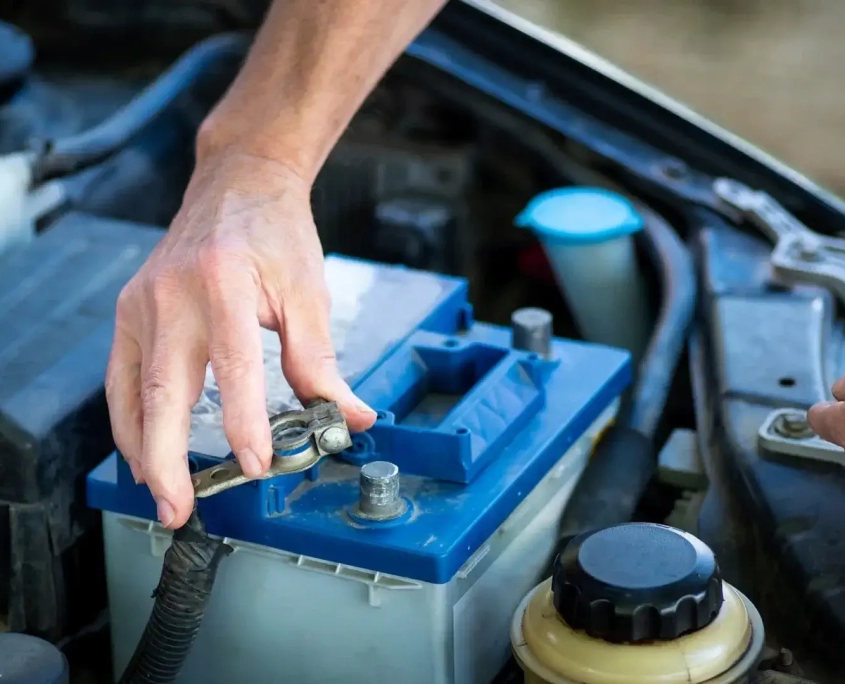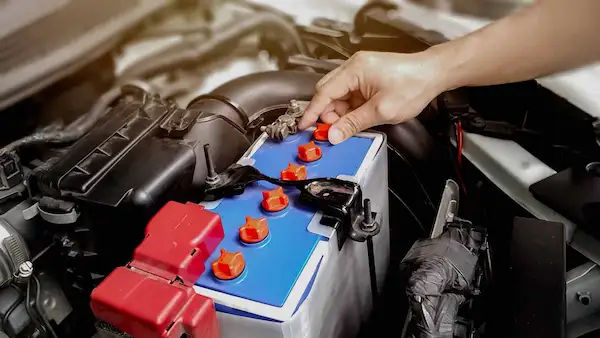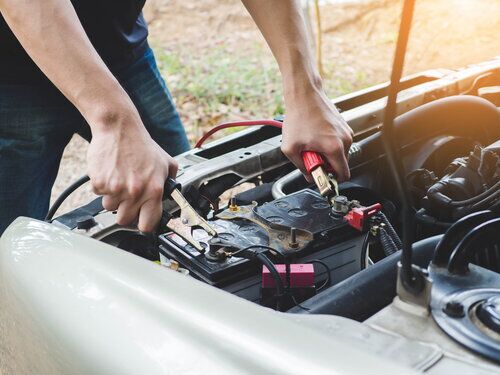Can you use a marine battery in a car? is not a difficult question. Yes, you can use a marine battery in a car, but it is not recommended. Marine batteries are designed for different purposes. Ok, let me explain the details in my whole article.
Marine batteries are built to power boats and other watercraft, offering deep cycle capabilities. They can handle frequent discharges and recharges better than standard car batteries. Car batteries, on the other hand, are designed to deliver a high burst of power to start the engine.
Using a marine battery in a car can lead to suboptimal performance and potential damage to the vehicle’s electrical system. For optimal results, it’s best to use a battery specifically designed for your car. This ensures proper functioning and longevity of both the battery and the vehicle. Always consult your vehicle’s manual or a professional mechanic for advice.
Introduction To Marine Batteries
Marine batteries are essential for boats and other watercraft. They power critical systems like engines and electronics. But can you use a marine battery in a car? To answer this, let’s first understand what a marine battery is.
What Is A Marine Battery?
A marine battery is designed for boats. These batteries can handle harsh marine environments. They power engines, lights, and other devices on boats.
Marine batteries are tough and resistant to vibrations. They are built to last long in water conditions.
Types Of Marine Batteries
There are three main types of marine batteries. Each type serves a different purpose.
| Type | Description |
|---|---|
| Starting Battery | Used to start the boat’s engine. Provides a quick burst of power. |
| Deep Cycle Battery | Provides steady power over a long time. Ideal for trolling motors and electronics. |
| Dual Purpose Battery | Combines features of starting and deep cycle batteries. Can start engines and power devices. |
Understanding these types helps in knowing if they can work in cars.

Credit: manlybattery.com
Car Batteries Vs. Marine Batteries
Are you wondering if you can use a marine battery in your car? Understanding the differences between car batteries and marine batteries can help you make an informed decision. Let’s dive into the key differences and performance comparison of these two types of batteries.
Key Differences
Car batteries and marine batteries are designed for different purposes. Here are the main differences:
| Feature | Car Battery | Marine Battery |
|---|---|---|
| Design | Optimized for high cranking power | Designed for deep cycling and cranking |
| Usage | Starts the engine | Powers boat electronics and starts the engine |
| Durability | Short bursts of energy | Longer, steady energy output |
| Construction | Thin plates for quick energy release | Thicker plates to withstand vibrations |
Performance Comparison
Let’s compare the performance of car batteries and marine batteries:
- Starting Power: Car batteries excel in providing high starting power. Marine batteries also offer starting power but are not as strong.
- Deep Cycling: Marine batteries are better for deep cycling. Car batteries cannot handle deep cycling well.
- Vibration Resistance: Marine batteries have thicker plates. This makes them more resistant to vibrations.
- Lifespan: Marine batteries often have a longer lifespan. This is due to their robust design.
In summary, while both types of batteries can start engines, their designs serve different needs. Understanding these differences ensures you choose the right battery for your vehicle.
Compatibility Factors
Thinking of using a marine battery in your car? Several factors decide its compatibility. Understanding these helps ensure a smooth experience. Below are key factors to consider.
Voltage Requirements
Both car batteries and marine batteries usually have a 12-volt system. This similarity makes swapping them possible. Ensure the marine battery has a 12-volt rating. Using a different voltage can harm your car.
Battery Size And Fit
Cars have specific battery compartments. A marine battery should fit these compartments. Check the dimensions of your car’s battery space. Compare these with the marine battery’s size.
Here is a table for clarity:
| Battery Type | Average Dimensions (LxWxH) |
|---|---|
| Car Battery | 9.1 x 7.8 x 9.0 inches |
| Marine Battery | 12.4 x 6.9 x 9.4 inches |
The marine battery might be larger. Ensure it does not exceed your car’s space.
Pros Of Using Marine Batteries In Cars
Marine batteries are built to withstand harsh conditions. Many people wonder if they can use these sturdy batteries in cars. The answer is yes, and there are several benefits. Here are some of the pros of using marine batteries in cars.
Durability
Marine batteries are designed to handle rough and tough environments. They can endure vibrations and shocks better than regular car batteries. This makes them more durable. If you drive on bumpy roads, a marine battery might be a good choice. It will last longer and save you money in the long run.
Versatility
Marine batteries are highly versatile. They can be used in different vehicles. Boats, cars, and even RVs can use these batteries. This versatility makes them a convenient option. If you have multiple vehicles, you can use the same type of battery. This means fewer replacements and easier maintenance.
Cons Of Using Marine Batteries In Cars
Marine batteries and car batteries serve different purposes. Using a marine battery in a car can lead to several issues. These issues can affect performance and cost. Let’s explore the key cons.
Cost Implications
Marine batteries are often more expensive than car batteries. This higher cost can add up over time. Car batteries are designed for specific tasks. Marine batteries are made for different uses, like powering boats. This makes them more costly. You might spend more money without gaining extra benefits.
Potential Performance Issues
Marine batteries and car batteries have different performance needs. Marine batteries are designed for long, steady power. Car batteries need to provide a quick, strong burst of energy to start the engine. Using a marine battery in a car can lead to starting issues. This can make your car less reliable.
Here are some potential performance issues:
- Starting problems: Marine batteries might not provide enough power to start the car quickly.
- Shorter lifespan: Using a marine battery in a car can reduce its lifespan.
- Compatibility concerns: Marine batteries may not fit well in the car’s battery compartment.
These performance issues can cause inconvenience. It’s best to use the right battery for the right purpose.

Credit: wowowow.com
Installation Considerations
When using a marine battery in a car, careful installation is crucial. This section will guide you through important safety measures and provide a step-by-step guide for a seamless installation process.
Safety Measures
Before you start, follow these safety measures:
- Wear protective gloves and goggles.
- Ensure the car is turned off.
- Disconnect the negative terminal first.
- Work in a well-ventilated area.
- Keep flammable materials away.
Step-by-step Guide
Follow this guide to install a marine battery in your car:
- Remove the old battery: Loosen and remove the negative terminal first, then the positive terminal. Lift the old battery out.
- Inspect the battery tray: Check for corrosion or damage. Clean if necessary.
- Place the marine battery: Position the marine battery in the battery tray. Ensure it fits snugly.
- Connect the terminals: Attach the positive terminal first, then the negative terminal. Tighten securely.
- Secure the battery: Use a battery hold-down clamp to keep the battery in place.
- Check connections: Ensure all connections are tight and secure. Double-check for any loose wires.
- Start the car: Turn on the car to test the battery. Listen for any unusual sounds.
Following these steps will ensure a safe and effective installation.
Maintenance Tips
Maintaining a marine battery in a car requires special care. Proper maintenance ensures longevity and efficiency. Follow these tips to keep your battery in top shape.
Routine Checks
- Inspect the Battery: Check the battery for any signs of damage. Look for cracks, leaks, or any other physical issues.
- Test Voltage: Use a multimeter to test the battery voltage. Ensure it stays within the recommended range.
- Clean Terminals: Keep battery terminals clean and free of corrosion. Use a wire brush and a mixture of baking soda and water.
- Check Fluid Levels: If your marine battery is not sealed, check the electrolyte levels. Top up with distilled water if needed.
Proper Storage
- Store in Cool Place: Store the battery in a cool, dry place. Avoid extreme temperatures to prevent damage.
- Disconnect When Not in Use: If you won’t use the car for a while, disconnect the battery. This helps prevent drainage.
- Use a Battery Maintainer: Use a battery maintainer to keep the charge steady. This prevents the battery from discharging completely.
- Avoid Complete Discharge: Never let the battery discharge completely. This can damage it permanently.
Following these tips ensures your marine battery lasts longer. Regular checks and proper storage are crucial. Keep your battery healthy for optimal performance.

Credit: www.rbbattery.com
Conclusion
Can you use a marine battery in a car? Using a marine battery in a car is possible but not ideal. Marine batteries are designed for different needs. They can work temporarily, but a car battery is better suited. Always consider your vehicle’s requirements before making a switch. For best performance, use the battery type recommended by your car manufacturer.

